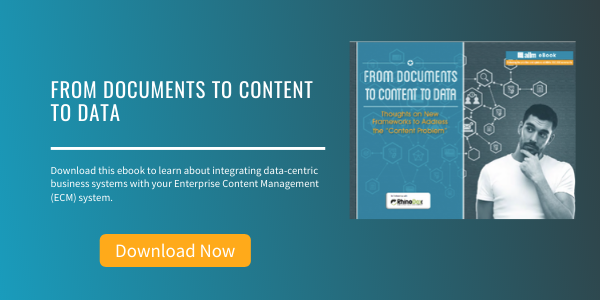
8 Reasons to Consider a Document Management Service Company as Part of Your Information Strategy
Document Management | Capture and Imaging
Document Management Service Companies are the Rodney Dangerfield of the ECM industry -- they just don't get no respect. Or maybe a better way of saying this is that they are the great hidden treasure of the document management industry.
Last year, Mitch Taube from Digiscribe wrote an article for us about the eight things you should look for in a document management service provider. The piece was very insightful in helping end-users sort through how to choose among service providers.
But that begs the question of why an organization would think about working with a document management service company or service provider in the first place.
So I thought I would post my opinions on the role that service companies play. (Any resemblance between me and Rodney Dangerfield is purely coincidental.)
Why Should You Consider a Document Management Service Company?
-
The modern service company ain't your father's service bureau.
Because service companies have been a part of the document industry for so long, sometimes there is a preconception that they are not skilled in the latest technologies. Nothing could be further from the truth. The modern service company offers a wide portfolio of services -- outsourced scanning, software sales, and the professional services to tie everything together. There are many organizations for whom document management is not a core competency -- nor should it be. A service company can fill this gap, and do so with a guarantee that the parts will fit together.
A professional service company has probably seen every size and type of document known to organizations today. They have a wealth of experience in solving problems in all industries and can often suggest a better solution than what a company may develop internally. The service provider is constantly in touch with business partners that have new solutions that can be applied to old problems.
-
On the other hand, it very likely COULD be your father's service bureau -- and that's not a bad thing.
Unlike many companies that have only been in the information management business for years -- or months -- many service companies in the document industry have been around for decades. Many got their start in the microfilm business. One of the best events AIIM does is an annual Executive Forum for owners and senior executives of service providers. This event has been in existence for more than 30 years and is more successful than ever.
In an industry with many fleeting connections, this longevity and commitment -- within the industry and within local communities -- is a valuable asset. It provides a guarantee to end-users that they will have a stable and committed partner so that they can focus on their core business.
-
The information management landscape is changing rapidly.
Partnering with a progressive and quality document management company will provide you the peace of mind that comes with knowing where the land mines are and allow you to concentrate your efforts on your core business development. The nature of the conversion business dictates that you must continually update software and hardware offerings to stay current with the latest technology. Corporations attempting to do their own scanning and information processing are not going to update software and hardware anywhere near the regularity of a full-service conversion partner.
-
This document stuff just ain’t what you wanna do for a living.
What are the questions that should be asked by any business to determine if a function is a core competency? If the answer to any of these three questions is “no." you should seek to outsource the function.
- If my organization was started today, would we do it ourselves or contract it out?
- Could we do it so well that others would hire us to do it for them?
- Will future leaders of my organization come from this skill set?
For most companies looking at either large backfile capture projects or ongoing scanning, the answers to ALL of these questions is “no." If the job ain’t one you wanna do and DO RIGHT, you should look for a company for which this IS their core competency!
-
Service companies do way more than just scanning.
These days most service bureaus offer much more than just scanning. They actually offer solutions to client business problems, and in this day and age, that is what clients should be looking for in a service bureau. This might come with consulting with the client on how to index the scanned documents for easy retrieval, offering a document management system, offering a capture solution, or e-forms package. All of these are offered to the client to make their job more efficient, and in the end, be more productive and drive down the cost of doing business.
-
It’s the security stupid!
We are continually reminded of the importance of protecting confidential information and personal identification that is often found on the documents being converted. A professional document conversion company will be SAS 70 Type II Certified and PCI DSS Certified, and will often be in compliance with new data privacy laws being enacted at the state level. These requirements mandate items like background checks on all employees, CORI investigations, 24X7 building security from an outside agency, multiple building entrance requirements, and detailed procedures for chain of custody when customer documents are in their possession.
-
Your staffing requirements fluctuate.
Dealing with multiple clients and a variety of application solutions allows the professional service company to maintain a qualified staff and distribute the workload appropriately. Companies that try to maintain an in-house scanning operation must deal with personnel issues, promotions, absent staff, etc. that will disrupt the orderly conversion of documents and data because this is not their core business.
-
What's worse than no document management system? A document management system with nothing in it!
We frequently find end-users who spend an enormous amount of effort to select a document or ECM system, but next to no thought or planning on actually getting information into that system. The last thing you want to do with your brand spanking new document management system is to spend precious staff time doing backfile conversion. Leave that to the professional and focus on your business.
About John Mancini
John Mancini is the President of Content Results, LLC and the Past President of AIIM. He is a well-known author, speaker, and advisor on information management, digital transformation and intelligent automation. John is a frequent keynote speaker and author of more than 30 eBooks on a variety of topics. He can be found on Twitter, LinkedIn and Facebook as jmancini77. Recent keynote topics include: The Stairway to Digital Transformation Navigating Disruptive Waters — 4 Things You Need to Know to Build Your Digital Transformation Strategy Getting Ahead of the Digital Transformation Curve Viewing Information Management Through a New Lens Digital Disruption: 6 Strategies to Avoid Being “Blockbustered” Specialties: Keynote speaker and writer on AI, RPA, intelligent Information Management, Intelligent Automation and Digital Transformation. Consensus-building with Boards to create strategic focus, action, and accountability. Extensive public speaking and public relations work Conversant and experienced in major technology issues and trends. Expert on inbound and content marketing, particularly in an association environment and on the Hubspot platform. John is a Phi Beta Kappa graduate of the College of William and Mary, and holds an M.A. in Public Policy from the Woodrow Wilson School at Princeton University.



